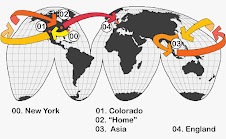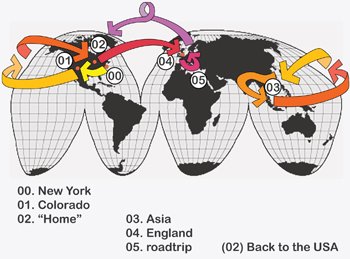Tourism does wonderful and horrible things to a place. Last weekend we visited a beautiful little mountain hill station called Sapa, in the northwestern corner of Vietnam, and while the scenery was absolutely breathtaking, both Meg and I had a difficult time with some of the people we met there.
Read the rest with lots of Sapa photos...
Sapa is a French Colonial town in the midst of local indigenous people (minority people). These folks, like the other minority folks we've met, have lived almost exclusively in the isolated mountains between Vietnam and China and consequently have cultures that are unique to themselves. These regions were more or less closed off to the broader world until about 1993, when suddenly foreign tourists were allowed to come in. And how they came in. Sapa is now one of the hot spots of Tourism in Vietnam, with thousands of people visiting on the weekend (because there are several large markets in the area) and a decent number of people during the week as well. Sapa's fame really draws people in as they come to see the beautiful views and the local tribes in their traditional clothes, which are quite unique. We took the night train from Hanoi to Sapa last Friday, arriving in a fine drizzle and enjoying a day of relaxed coffee-drinking and journal-writing before venturing into local villages.
Sapa itself is a simply beautiful place. It literally is this idyllic small town located at the top of a ridge looking down onto a valley of stepped rice paddies. It is often cloudy, rainy, and cold there (yes, I was actually cold for about 5 minutes!) because clouds roll into the valley and then slowly creep over the ridge. When the clouds break it is simply breathtaking, and even when it is overcast there are still these wispy clouds crawling through the mountain side. It is, as one guide book puts it, "A justifiable tourist trap."
Now the problem of Sapa is this: there are a variety of local peoples who have lived in (relative) isolation for several hundred years but were suddenly introduced to Tourism when the floodgates opened and they, like all good entrepreneurs and people who find themselves on the other side of a tourist trap, find ways to make it work for them. This changes their traditional way of life in many ways as they slowly begin to work and function as part of this tourist trap. For example, most of the women no longer work in the fields but spend their time making hand(ey) crafts for tourists. Many children no longer go to school because they will make more money peddling to tourists than they will in other jobs. We even encountered a random ticket booth along the road- we had to pay just to walk through a village! Not that these changes are inherently bad (though I find them disheartening) because they bring some much-needed revenue to an otherwise poor region. But I think it changes the make up of a place. Whereas before tourists went to Sapa to see these (untouched)people and go to markets, etc... now it almost felt as if there was a performance set up everyday by the minority peoples. I know this isn't entirely true, but it certainly wasn't the visit to "traditional" villages of minority peoples I had expected.
Another, more unfortunate, side effect is the kind of sellers these woman have become (more often than not). They walk around the streets pressing everyone they meet into a sale (which isn't an overly uncommon selling technique in Vietnam though they reached a new level of persistence). Unlike many of the other places and sellers in Vietnam, these women were not rebuffed by simply saying "no" several times but would walk with you and continue to try and convince you why you should by their bag, necklace, pillow cover, opium, etc... Sometimes after we had said no to a seller several times she simply would follow us around, not asking anymore but just to watch and see what we did... or perhaps to be there just in case we felt inspired to by 5 new embroidered pillow covers. The women in the "I'm huge!" post for example walked with us for over a mile. They met us en route to another village and they asked us to buy things. We politely declined and continued on our way, wherein they decided to follow us. Three kilometers later we reached our destination and then they began to try and sell us stuff again, now using the phrase, "Me walk with you long time, why you no buy from me?" They also had excellent English and would begin a conversation with kindly questions about country of origin, name, siblings, age. etc. This would seem so nice until they asked you to buy something, making the entire pleasant conversation seem suspiciously like a sell-tactic.
I guess more than this being an undisputed problem, I just find this progression rather sad. People left traditional ways of life to meet the desires of rich travelers and this move strikes me as a perversion of their previous lives and of what I want traveling to be. I don't know if I have the right to say such a thing but it just feels wrong to pimp your culture out for cash (I come from the richest country in the world and where we don't just pimp out our culture we export it by the truck loads). More than anything I was just sad that I found myself becoming aggravated by (otherwise sweet) 20 year old women who are just trying to get by.
I should quickly add that we did meet some very nice women. They asked the typical introduction questions (name, age, siblings, married, children) and then we asked them the same ones- without getting asked to buy something. They even remembered our names and when we saw them the next day they ran up to say hello and chat. We also encountered less selling out in the countryside. We walked 9km to a village, a bit disappointed by the final destination, and decided to walk back to Sapa through the stepped rice paddies along the river. Not only was it a beautiful walk, but the people were also exceedingly helpful- pointing us in the right direction and yelling something in their language to get our attention when they saw us heading the wrong way. The hike turned into a 25km one, but it was our favorite day. The next day (Sunday) we went on a day trip to the BacHa market, a supposedly huge market with a few different people-groups attending. However, we were frustrated when we encountered more of the aggressive selling there. (We did happen to see the friendly women from the day before in Sapa. Apparently they had never been to the BacHa market and were visiting also as "tourists". The local people, being from a different people group, stared at their costumes- funny how groups of people we associate with each other are still so distinct amongst themselves.)
I don't know who is at fault in situations like these, or if any individual group is culpable. I am quick to point to ourselves as the incoming tourists, who have created this problem. It is because we will pay exuberant amounts of money for common items in these villagers lives, consequently changing the value of goods, that these minority people abandon their previous work. We are the ones who came into their villages to gawk, point, and take pictures. However, I don't think its fully genuine to place the blame solely on us. They are the ones who have chosen to do nothing but sell to tourists. They are the ones who choose to sell in such an abrasive manner, that I find myself defensive towards most women I met there. Ultimately I think that the present situation is what it is because... well... people want to make a buck and the method they've developed is the quickest way to do that. Why simply farm rice when you can sell a cheap pair of earrings for a dollar? It seems like an inherent aspect of tourism and while I'm sure someone somewhere has begun working on solutions for it... I'm not sure what they are.


4 comments:
I think think that what you've encountered is characteristic of many, many parts of the world. My sense is that pioneering Christians (of many nationalities) need to lead the way in sustainable, wise commerce, which includes but is not limited to tourism.
One of the great things about market system is that (in general) those who do something well gain market share, and so others, who might not do use wise and sustainable business practice by conviction, will be drawn to it by necessity and modeling.
Thanks again for your reflections, and for the outstanding pictures!
Thanks for the comment graham- do you have any ideas for such "sustainable, wise commerce"? It's difficult to be a tourist in a place where you do want to see the people and culture, but wish it could be done invisibly!
In one part of Northern Laos (where we are now), they have an office that all treks/tours must go through, so they are able to limit the number and types of tourists/ companies that visit. They are also better able to steer revenue directly to the villagers.
I think we are seeing the results of recent unchecked growth in tourism reacting with fairly poor, isolated communities.
I am in luang prabang right too, having pass by sapa too. Rather than dwelling on the "pesky" nature of the touts in sapa, i'm disheartened by the overall lack of education in the area. I was approached by kids in the mountainous area trying to sell me bangles and such. If the level of education does not increase, the people would turn to tourism for their lifeline. I do not agree that it's the christians who should lead the way out of their poverty. Everyone plays a part. You are talking about south east asia here where the majority of them are not christians. Help them help themselves. Do not perpetuate their dependence on the westerners!
Hey, thanks for posting! I agree that it's not just Christians who need to pay attention. I think Graham, speaking as a Christian, is just calling for us to be more mindful of the duties and obligations that Christians and those of most other faiths should adhere to (love your neigbor as yourself).
The lack of education is interesting- we heard from a tour guide that the minority people actually get free university education, unlike any other Vietnamese students, so you would think that wouldn't be the heart of the problem. Perhaps. I think it's more the regulation of tourism- unfortunately they can make more selling bangles and opium without education than at a legitimate job that requires years of schooling.
For example, we've heard that high school teachers in Hanoi actually make more as cyclo drivers than they do teaching. Whether this is still true, I don't know, but it's a horrible thought as the intended recipient of those cyclo rides...
Post a Comment